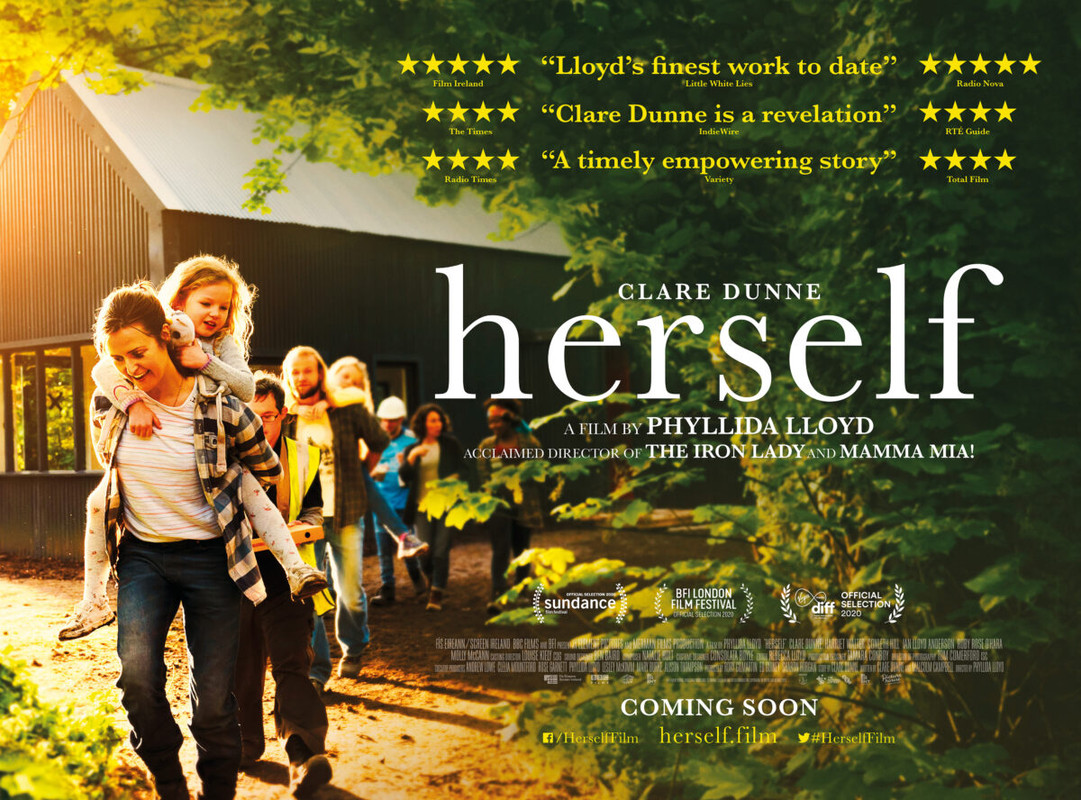Dir: Phyllida Lloyd
I’d argue that you’d be hard pushed to find a more unlikely subject for a crowd-pleaser than Margaret Thatcher, but since Phyllida Lloyd apparently pulled that trick off with her last film, The Iron Lady, why not one with this subject matter?
Herself centers on Sandra (the film’s co-writer Clare Dunne) who, in her 30s, finds herself with two young daughters (Molly McCann and Ruby Rose O’Hara), living in a hotel, having left her abusive partner Gary (Ian Lloyd Anderson). Seeking a more permanent fix, she decides that she wants to build a home, getting the space and a loan of the money from one of her employers, Peggy (Harriet Walter).
For much of its running time, Herself is exactly the film you’d expect it to be given its director’s pedigree (she also directed the first of the Mamma Mia films). Given the storyline it is surprisingly breezy, never quite glossing over the challenges in Sandra’s life, but also generally making sure that easy fixes fall into place as the plot demands. For instance when the council, despite Sandra’s suggestion that they would profit from helping her build the house, won’t even discuss it, an offer of land and a £35,000 loan over “however long we decide” comes within five minutes and two scenes.
What Dunne and Malcolm Campbell’s screenplay does capture in its lighter than expected tone is Sandra’s effort to always keep a bright outlook for her girls. We’re not seeing the action through their perspective, but wherever they are on screen the characters around them and the film itself seem to make an effort to make the world seem friendlier than Sandra knows it can be.
As an actor as well as a writer, Clare Dunne impresses, so much so that she makes some of Lloyd’s directorial choices feel clunky. Over and over, when Sandra has a moment of reflection about Gary, Lloyd will cut to a bit of the awful abusive scene we see in the film’s first few minutes. We simply don’t need these cuts, we know exactly where Sandra’s mind is because the story is all there, written all over Sandra’s face. Outside these moments, Dunne gives Sandra a very real and warm relationship with her kids and is convincing as she is both wary of and aware that she might still be somewhat sucked in by Gray, if she were to allow herself to be.
The acting is good all round, with Harriet Walter increasingly feisty as Peggy and Molly McCann and Ruby Rose O’Hara giving very natural performances as Sandra’s daughters. Compared to these key roles, Gary is rather underwritten, but Ian Lloyd Anderson does what he can with a fairly transparent role.
As Sandra draws a ragtag band of largely volunteer builders together, things progress more or less as you’d expect. Badly chosen music soundtracks building montages and a couple of accidents, arguments, and one more dramatic, but no less predictable, turn of events raise their heads. It’s all well played and the tone is well-balanced between drama and lighter moments, but I found it all just washing over me. The film’s last ten minutes or so change that, delivering an emotional gut-punch I didn’t expect and finding a final scene that is not only moving but manages to wrap the film’s themes and its message up in a bow without seeming trite or treacly.
Herself isn’t perfect, but it suggests a successful future for Clare Dunne as both an actor and a writer and it will probably be one of the year’s less likely crowd-pleasers.
★★★


No comments:
Post a Comment